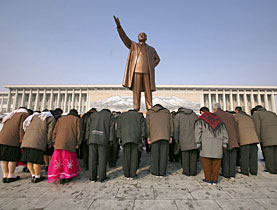North Korea raises diplomatic stakes

A Swiss security expert sees Monday's nuclear test by North Korea as an effort to boost its bargaining power and bring Washington to the table for bilateral talks.
Victor Mauer, deputy director of the Center for Security Studies at the Swiss Federal Institute of Technology in Zurich, also told swissinfo.ch that China would play a central role in any solution.
Switzerland joined a chorus of voices from around the world in condemning North Korea’s second nuclear test on Monday. The communist regime exploded its first nuclear device in 2006 to much international consternation.
“Switzerland is convinced that the North Korea nuclear question can only be solved with negotiations and diplomacy,” the foreign ministry said. “In this regard it supports the resumption of six-party talks.”
North Korea began multilateral talks over its atomic programme in 2003 – with South Korea, the United States, Japan, Russia and China. But Pyongyang withdrew from any agreements after the UN tightened sanctions on North Korea for a rocket launch in April this year.
North Korea’s nuclear test is also seen as severely straining relations with China. Traditional allies for decades – Chinese troops fought on the North’s side during the 1950-53 Korean War – China is still North Korea’s biggest source of food, fuel aid and diplomatic support.
On Tuesday Chinese foreign ministry spokesman Ma Zhaoxu repeated an earlier ministry statement saying Beijing “resolutely opposed” the nuclear test and urged Pyongyang to return to the negotiations, under which it had agreed to dismantle its atomic programmes.
swissinfo.ch: Governments around the world, including Switzerland’s, have condemned North Korea’s latest nuclear test – is this enough?
Victor Mauer: Given that the nuclear test is a violation of international law and threatens regional and international peace and stability, I think we will see more [action], not least because the Chinese are as outraged as all the other countries. It is likely that we will see further sanctions imposed on North Korea, but it is far from clear whether these can persuade the country to rejoin talks on ending its nuclear programme.
swissinfo.ch: It looks unlikely that North Korea will return to the six-party talks.
V.M.: Indeed, the North Koreans announced a few weeks ago that the six-party talks didn’t have a future. On the other hand, what the North Korean regime is really after are bilateral talks with the United States.
swissinfo.ch: Why did North Korea test another nuclear device and why now?
V.M.: First of all, testing a nuclear device with an explosive force equivalent to the atomic bombs dropped on Japan during the Second World War is to prove the nuclear capability the country has obtained over the past years. And secondly the North Korean regime hopes to gain more leverage, especially when it comes to negotiations with the Americans, i.e. to press for more economic aid and diplomatic concessions. That’s immensely important, knowing the dismal state North Korea finds itself in.
The key question will be whether the US and the Chinese can agree on a common policy. While the Chinese are as irritated as the Americans, they don’t want to see the collapse of the North Korean regime as this could lead to the unification of the two Koreas, the stationing of US troops in their immediate neighbourhood and as a result undermine their own position in the region.
swissinfo.ch: Were you surprised by Monday’s test?
V.M.: Not at all. It was in the making. When the negotiations stalled and North Korea essentially decided not to resume the six-party talks and go it alone it was just a question of time.
swissinfo.ch: How technically advanced is North Korea?
V.M.: In terms of testing they seem to have made a major step forward. The key question is whether and when they will be in a position to put a nuclear device on a deployable weapon.
swissinfo.ch: What’s the likelihood that they would use the bomb given the opportunity?
V.M.: Very limited. First and foremost, they would use it as a means of deterrence, but not deploy it. And secondly, they could threaten to proliferate. That’s the real danger.
Thomas Stephens, swissinfo.ch
Switzerland, along with Sweden, is a member of the supervisory commission which ensures compliance with the armistice between the two Koreas.
In the wake of the famine of the 1990s, Switzerland was one of the first to offer humanitarian aid.
And almost alone among donors, it subsequently turned its humanitarian commitment into a long-term development programme. The programme is run by the Swiss Agency for Development and Cooperation.
Much of the programme is specifically geared to improving agricultural output, but it is also aimed at integrating North Korea into the international community.
Swiss cooperation has been strongly criticised in parliament, and is to end after 2011.
Kim Jong-il’s third son, Kim Jong-un, whom many observers think will succeed his father, spent some of his teenage years at school near Bern.
Victor Mauer is deputy director and head of research at the Center for Security Studies in Zurich.
He studied political science, history, international law and international relations at the universities of Bonn, Oxford and Cambridge.
His areas of expertise include European security, European integration, NATO, trans-Atlantic relations, German foreign policy and politics, as well as the Cold War.

In compliance with the JTI standards
More: SWI swissinfo.ch certified by the Journalism Trust Initiative















You can find an overview of ongoing debates with our journalists here . Please join us!
If you want to start a conversation about a topic raised in this article or want to report factual errors, email us at english@swissinfo.ch.